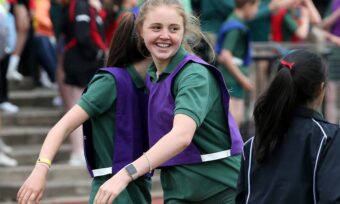[vc_row][vc_column][vc_column_text css=”.vc_custom_1517394329829{margin-bottom: 0px !important;}”][vc_row][vc_column][vc_column_text css=”.vc_custom_1516879956400{margin-bottom: 0px !important;}”]
Future destinations that pupils of Physical Education may pursue include, but are not limited to, Sports Coaching, Sports Science, Nutrition, Professional Sportsperson, Chiropractor, Physical Therapist, Occupational Therapist, Athletic Trainer, Physical Education Teacher, Fitness Specialist (Personal Trainer, Fitness Director, Geriatric Fitness Specialist, Athletic Coach or Dance Instructor), Dance Medicine, Gerontology, Exercise Science or Sports Medicine. Careers with the police or fire services as well as the military benefit from Physical Education qualifications.
Wellington School has a long established and well-earned reputation for excellence in sport. The main team sports are hockey for girls and rugby for boys but the school provides a wide array of opportunities for pupils of all ages to participate and excel in a variety of sports.
Pupils are encouraged to test their skills by playing competitively at all levels, which has contributed to a number of former pupils making sport their career.
Core P.E
From S1 to S6, all pupils experience a broad education in a variety of sports. This gives them a basic knowledge which can then be applied to a particular sport, if the pupil wishes to specialise. At this stage, both individual and team sports are encouraged and pupils are given the opportunity to compete in Hockey, Rugby, Cross Country, Athletics, Swimming and Netball.
National 5
Pupils in S3 and S4 focus on their own performance and how it can be improved. The National 5 course comprises two units: Performance Skills and Factors Impacting Performance.
Course Assessment consists of a single performance where pupils plan, carry out and then assess their performance. The National 5 requires pupils to produce a portfolio, a collection of evidence showing learning throughout the course. The single performance is worth 60% of the overall grade and the portfolio accounts for 40%.
Group activities covered in the National 5 course include Basketball, Badminton and Fitness, while individual activities are focused on Swimming and Gymnastics. For assessment purposes, pupils select their strongest sports from both the group and individual categories.
The course also covers the mental, emotional, social and physical factors of performance. Data collection forms a significant part of the process and evidence of this will be continually assessed throughout.
Higher
Higher Physical Education covers two internal units: Performance Skills and Factors Impacting on Performance. The main purpose of the Higher is to develop and demonstrate a broad and comprehensive range of complex skills in challenging contexts.
The main aims of the course enable pupils to:
- Develop a broad and comprehensive range of complex movement and performance skills, and demonstrate them safely and effectively across a range of challenging contexts
- Select and apply skills and make informed decisions to effectively perform in physical activities
- Analyse mental, emotional, social and physical factors that impact on performance
- Understand how skills, techniques and strategies combine to produce an effective performance
- Analyse and evaluate performance to enhance personal effectiveness
By actively participating in physical activities, pupils will demonstrate initiative, decision-making and problem-solving. They will experience a range of roles and responsibilities, and this will enable them to develop their interpersonal skills. The course also provides an opportunity to support the way that individual attitudes, values and behaviours are formed as physical education contributes to social, mental and emotional development.[/vc_column_text][vc_column_text css=”.vc_custom_1516879968625{margin-bottom: 0px !important;}”]
Curricular Activities and Extracurricular Clubs
Opportunities and Mentoring
The department offers a number of opportunities to play sport both in and out of school. Inter house sports include Golf, Rugby, Football, Rounders, Netball, Hockey, Swimming while inter school sports extend to Rugby, Hockey, Netball, Athletics, Cricket, Cross Country, Aquathon, Swimming, Tennis and Rounders.
Senior 6 pupils, pupils from other schools and college students are given the opportunity to help with the nursery and primary classes.
Extracurricular Gymnastics and Dance
The Gymnastics Vaulting and Dance clubs are extremely popular. Dance Club welcomes pupils from P6 to S6 and in 2016, the former Head Girl was also Dance Captain. Acting as an ambassador for dance, the Captain was a mentor for younger pupils.
The Dance Club also organises an annual Dance Showcase where pupils choreograph and perform their own pieces.
Rugby
The Ayr Wellington side is the product of a successful partnership between Wellington School and Ayr Rugby Football Club. Ayr Wellington players have greatly benefitted from the amalgamation of facilities and expertise that both institutions have to offer. Player development is a key focus and includes work on tactics, strength and conditioning, and nutrition.
In 2016, the Ayr Wellington U18 and U16 teams both competed in the National Youth League Cup Finals at Murrayfield, and the U16 side emerged as National Youth Champions.
From P1, pupils are taught the requisite skills to play rugby and from the upper Junior School, boys are encouraged to join the school team and play competitively.
Learn More About Ayr-Wellington Here
[/vc_column_text][vc_column_text css=”.vc_custom_1516879774600{margin-bottom: 0px !important;}”]
International and Interdisciplinary Activities
National and international tours in other sports visit countries such as Holland, Spain, France, Italy and UK throughout the year.
A highlight of the calendar for rugby players in S1 and S2 is the annual tour to Wellington’s partner school in France, the Institut Saint-Dominique, just outside Paris. The Junior Rugby Exchange is an excellent example of the school’s interdisciplinary work, bridging both Modern Languages and Physical Education. The first tour took place in 2011 and has since become one of the highlights of the fixture list.
